
Patients with esophageal squamous cell carcinoma obtained significant survival improvements when treated with tiragolumab plus atezolizumab and chemotherapy compared with chemotherapy alone.

Patients with esophageal squamous cell carcinoma obtained significant survival improvements when treated with tiragolumab plus atezolizumab and chemotherapy compared with chemotherapy alone.
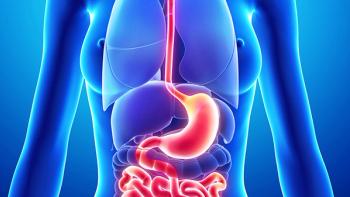
Patients with resectable gastric and GEJ cancers, regardless of region, experienced an improved pathologic complete response to treatment with durvalumab plus neoadjuvant FLOT compared with chemotherapy alone.

Overall survival and progression-free survival improves with nivolumab plus chemotherapy compared with chemotherapy alone in the overall population and in patients with a PD-L1 CPS of 5 or greater.

Nivolumab plus chemotherapy enhanced overall survival and progression-free survival in patients with advanced or metastatic gastric cancer, gastroesophageal junction cancer, or esophageal adenocarcinoma.
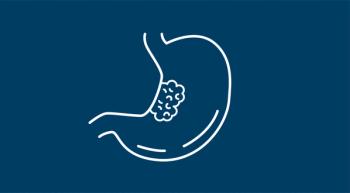
The addition of AB011 to chemotherapy yielded initial clinical responses in patients with gastric cancer or gastroesophageal junction adenocarcinoma.

Terri Pollack, DNP, APRN, FNP-C, PMHNP-BC, discusses key data that may affect clinical practice for nurses from the 2023 GI Cancers Symposium.

Circulating tumor DNA can be an effective biomarker that allows for assessments of early response.

In this episode of "The Vitals," Terri Pollack, DNP, APRN, FNP-C, PMHNP-BC, underscores potentially practice-changing data which were presented during the 2023 GI Cancers Symposium.
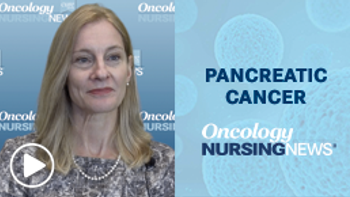
Karyn A. Goodman, MD, MS, provides perspective on the potential advantages of stereotactic body radiation therapy in locally advanced pancreatic cancer.

Terri Pollack, DNP, APRN, FNP-C, PMHNP-BC, shares some of her top takeaways from the 2023 ASCO GI Cancers Symposium.
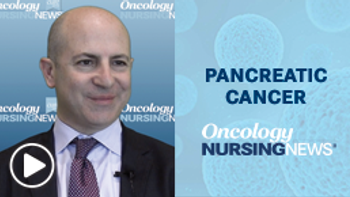
Zev A. Wainberg, MD, discusses the implications of the findings from the phase 3 NAPOLI 3 trial for patients with metastatic pancreatic ductal adenocarcinoma.

Patients with RAS-wild-type metastatic colorectal cancer did not experience a benefit in terms of response rate or survival when cetuximab was added to the first cycle of chemotherapy.

Nanvuranlat inspired better progression-free survival in patients with advanced, pretreated refractory biliary tract cancer, meeting the primary end point of a phase 2 trial.

Newer agents approved for frontline hepatocellular carcinoma, including lenvatinib, and atezolizumab/bevacizumab, yielded superior survival outcomes than sorafenib in a real-world setting.

Patients with hepatocellular carcinoma experienced better health-related quality of life outcomes with tislelizumab vs sorafenib.

Encorafenib plus cetuximab, along with chemotherapy, was linked to antitumor activity and a manageable safety profile in patients with BRAF V600E-mutant metastatic colorectal cancer.

Findings from the phase 3 SUNLIGHT study showed that adding bevacizumab to trifluridine/tipiracil boosted overall survival in metastatic colorectal cancer.

The median overall survival with frontline liposomal irinotecan/NALIRIFOX was 11.1 months vs 9.2 months with nab-paclitaxel plus gemcitabine in patients with metastatic pancreatic ductal adenocarcinoma.

The median overall survival with nivolumab plus chemotherapy was 12.8 months, vs 10.7 months with chemotherapy alone, in patients with treatment-naïve advanced esophageal squamous cell carcinoma.

Both the gastric and breast cancer HER2 scoring algorithms may be useful in determining which patients with metastatic colorectal cancer may derive benefit with tucatinib/ trastuzumab.

For patients with CLDN18.2-positive, HER2-negative locally advanced unresectable or metastatic gastric/gastroesophageal junction adenocarcinoma, treatment with zolbetuximab/mFOLFOX6 yielded a progression-free survival (PFS) of 10.61 months whereas placebo/mFOLFOX6 resulted in a PFS of 8.67 months.
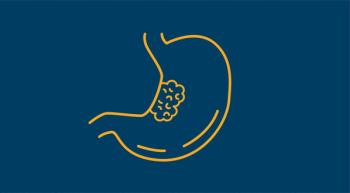
In an all-randomized population of patients with advanced gastric cancer, gastroesophageal junction, or esophageal adenocarcinoma, adding nivolumab to chemotherapy yielded a 21% reduction in the risk of death.

Patients with advanced hepatocellular carcinoma experienced similar health-related quality of life scores whether they received a combination of pembrolizumab and lenvatinib or lenvatinib and placebo.

The oral targeted therapy was linked with maintained appetite, eating habits, and physical function in patients with IDH1-mutated cholangiocarcinoma.
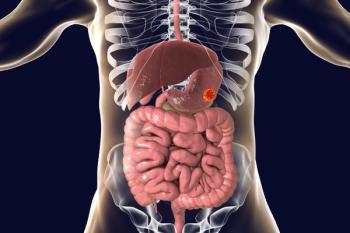
In a 12-month follow-up, the experimental regimen continued to provide clinical benefit to patients with esophageal cancer without compromising quality of life or exhibiting an unmanageable safety profile.

Patients with HER2-positive gastric cancer or gastroesophageal junction (GEJ) adenocarcinoma experienced a 40% reduced risk of mortality with fam-trastuzumab deruxtecan-nxki, compared with patients who received standard therapy.
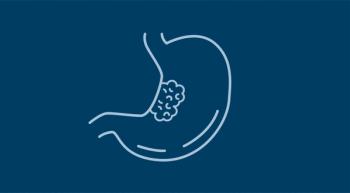
Pembrolizumab plus chemotherapy did not induce clinically meaningful survival benefit, compared with chemotherapy alone, in patients with advanced gastric or gastroesophageal junction adenocarcinoma and a PD-L1 combined positive score of 1 or higher.

The presence of Arthrobacter and fatty acid metabolism pathways in gut microbiomes may be linked to an increased risk of skin-related adverse events (AEs) in patients with advanced gastric cancer.

Checkpoint inhibitors may have clinical utility in BTC based on immunogenic features of the disease; however, limited clinical activity has been observed with single-agent therapy in the advanced setting.

Pending FDA approval, the dual immunotherapy combination could provide patients with a new treatment option which would not require any further safety requirements prior to initiation.